How a parish priest and Facebook millionaire serves his community
Oleksii Filiuk from the Lanivtsi community in the Ternopil region, a priest and blogger with 1 million followers on Facebook, adopts children, organises various cultural events and pays substantial taxes to the local budget
By Dmytro Syniak
‘Ah, so are you here to interview me?’ The short, handsome, balding man with the round face lights up with a pleasant smile. ‘Well, all right then. We will take a little break. All right, boys, it is break time!’ He puts down the shovel he has been using to load the cement mixture into the moulds that will form the future fence. The moulds are arranged around a neat yellow house with a blue, metal-tiled roof. The boys, two friendly young men, also put their tools aside. ‘Go and ask!’ the man says readily.
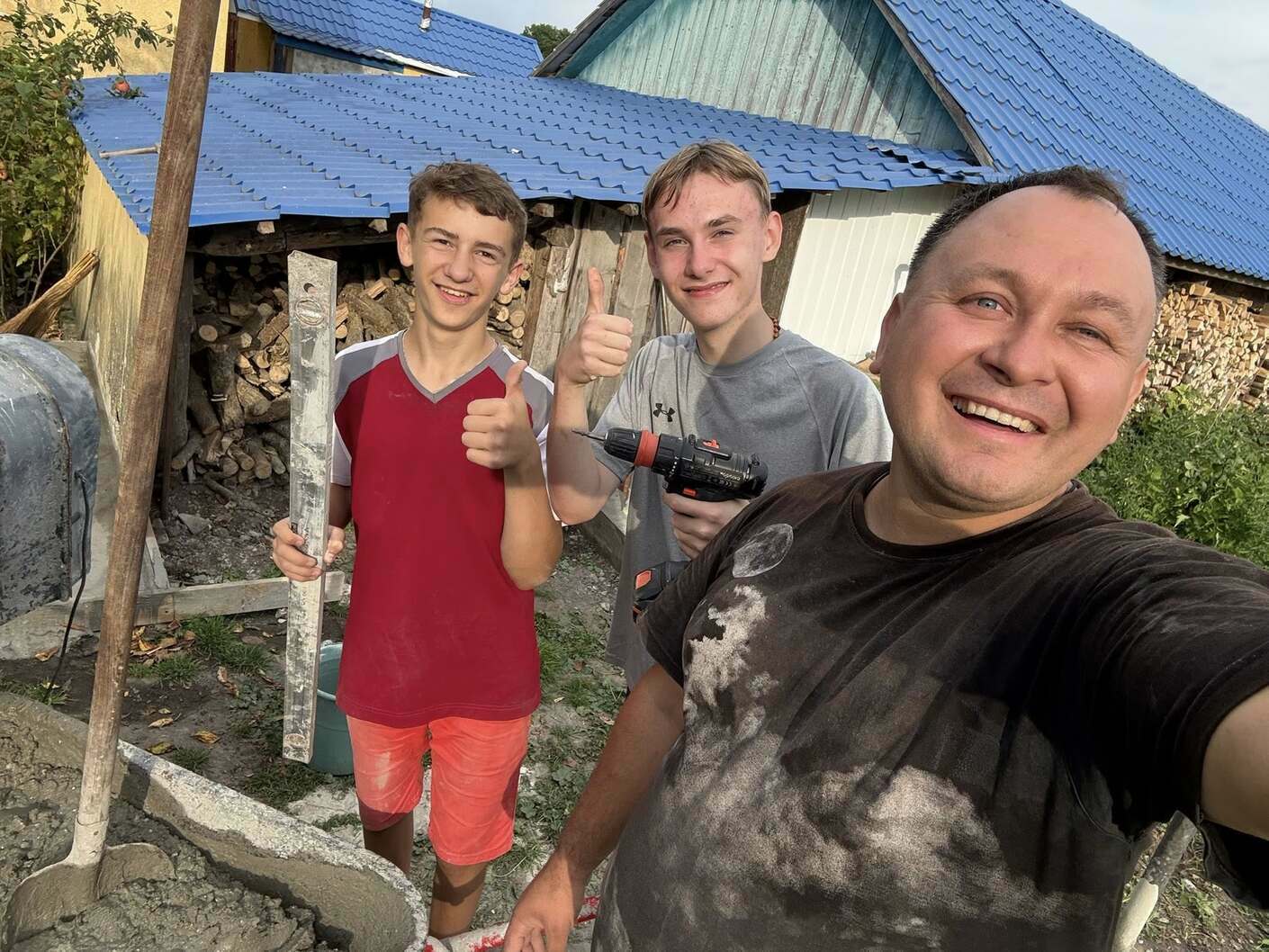
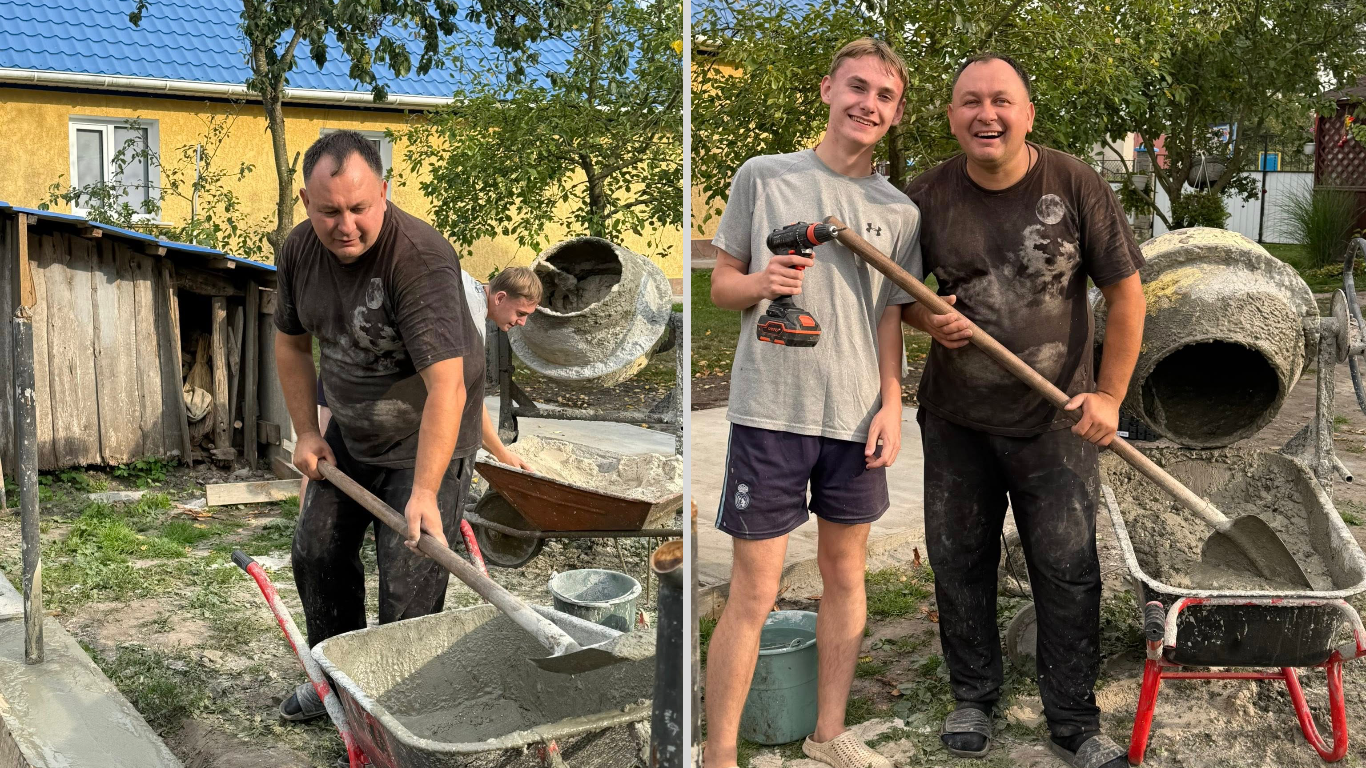
The Reverend Oleksii Filiuk, with his youngest sons, Maksym and Mykhailo, pouring concrete for the fence around the house of his eldest son, Viktor.
About the video by Father Filiuk, or How to break a spell?
He is Father Oleksii Filiuk, a priest of the Ukrainian Orthodox Church and rector of two churches: the Church of the Assumption of the Blessed Virgin Mary in the village of Shushkivtsi (with about 80 residents), and St. Michael the Archangel in the village of Bilozirka (with about 500 residents) in the Kremenets district of the Ternopil region. However, serving in the church is just one aspect of the priest's work. Aged 41, the Reverend Oleksii is a successful agricultural worker, community activist, blogger, local historian, tour guide and philanthropist. He is also the initiator of many cultural events in the Lanivtsi community, where he was born and raised. The two boys helping him with the fence are his sons, although they are not his biological children – they are adopted. The priest has adopted four orphans in total, and they are his only children: Victor (22), Serhii (18), Maksym (16) and Mykhailo (15). Father Oleksii and his wife divorced ten years ago, and since then he has devoted his life to serving people, the community, and the state.
It should be noted that the community, the church and the state did not go unrecognised for their dedication. In 2018, Father Oleksii won the ‘Person of the Year’ competition in the Ternopil region. In 2019, he was recognised by the Ternopil magazine City Life as the winner of the ‘Best Contemporary Priest’ category. In 2021, ICTV television included Father Filiuk in its ‘Top 100 Bloggers of Ukraine’ list, and the same year the Orthodox Church of Ukraine awarded him the Order of Archangel Michael II. Last year, the head of the Ternopil diocese, Metropolitan Nestor, came to Shushkivtsi especially to award him the Order of St. Nicholas, 1st class.
But that is not all. Oleksii Filiuk is probably the only priest in Ukraine with one million (!) followers on Facebook. Every evening at 9.30pm, he goes live with short sermons for several thousand viewers. But they are not his only subscribers. The short videos that Father Oleksii records daily are full of sincerity, energy, faith and simplicity. They are also delivered in such a rich folk language that it is impossible not to fall in love with them.
‘People ask me, “Father Oleksii! How can I remove a curse?’” says the priest in one of the videos recorded during his work trip to Vinnytsia. ‘How can you remove it? Take a good stick, like a gardener’s, and hit the person’s ribs repeatedly! The curse will be removed immediately! A person gets what they believe in. If a person has weak faith in God, they can be cursed and influenced by anything. Such a person, as they say, feels cold in the hot days of summer. But my dear brothers and sisters! When you believe in God's protection and power, no one can curse you! If someone has been cursed, take the stick and bless each other on the ribs to break those curses!’
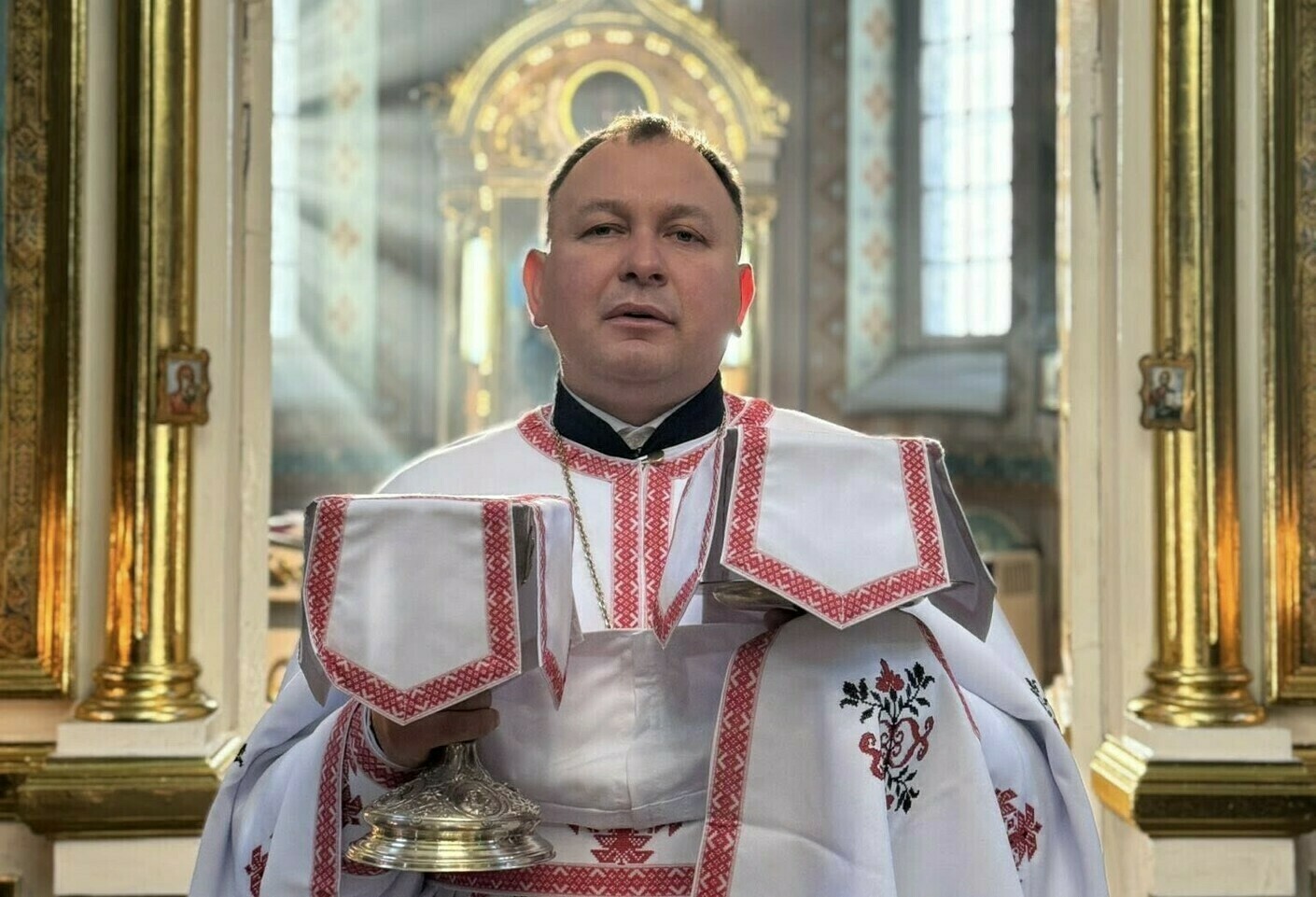
Father Oleksii during the service
Some people consider Father Filiuk to be almost a saint. People from all over Ukraine come to him to have their children baptised or to get married, or simply to receive his blessing. However, Father Filiuk himself does not like being treated like a saint.
‘All glory to God! I am an ordinary person who does what I love. Of course, I am glad that people appreciate my work, but I do not place too much importance on this. I believe that when each person serves God in their own way, God will bless them just as He has blessed me,’ says Father Filiuk, speaking simply and without a hint of moralising.
In his view, serving God is not only about conducting church services, but also about actively helping people and the community. This is precisely how the early Christians understood service.
‘To me, the church and the community are almost one and the same,’ says the priest. ‘Because the church is made up of people who live in a certain area, not a temple. The community is made up of the same people. When I organise community clean-up days, for example, I announce them in both the church and the city council. If someone needs help, other people try to help them first, irrespective of whether they are helping as members of the church or the community.’
When the war broke out, Oleksii Filiuk managed to find homes for 150 displaced people in the small village of Shushkivtsi. He personally drove them to households with spare rooms. While people could refuse the community leader’s request to take in ‘strangers’, they could never refuse the priest. After all, to do so would be an open admission of a lack of Christian love. Therefore, no one refused. Father Oleksii also asked his Facebook followers to donate furniture and household appliances, and these began to arrive from all over Ukraine immediately after his appeal.
Stories like this are commonplace for Father Filiuk and the Lanivtsi community.
Facebook star and UAH 350,000 for drones
Father Filiuk became a Facebook star quite unexpectedly for himself. He says that he never sought fame or tried to increase his number of followers; he simply talked about his life as a Christian, father, social activist, and humble patriotic Ukrainian. When the COVID pandemic broke out, he started posting prayers and short sermons on Facebook every day to help calm people down. He soon realised that people were interested in his sermons and were looking forward to them, so he decided that he could not disappoint them. This is why, for the past five years, day after day, Father Filiuk has been going live.
‘The church plays a significant role in supporting Ukrainian resilience during the war, particularly in rural areas and small towns,’ he says. ‘For example, in my home village of Shushkivtsi, there is no shop, no pharmacy and no village council; only a church and a starosta office. Therefore, the church often acts as a social welfare department, a youth department and a cultural department. People go to priests with their problems, troubles, dreams and hopes. And the church is trusted the most.’
This is why the church usually announces various fundraisers, primarily to support the Armed Forces of Ukraine. Recognising that it is difficult to collect large sums of money in the village, Father Oleksii often adapts the format of the assistance provided. For instance, he organises collections for a sack of flour and a sack of potatoes, enabling five or six housewives to come together and prepare several thousand varenyky (dumplings) for the soldiers on the front line. Once everything is ready, Father Oleksii collects various food preserves and other products from people’s houses and sends them to the military. There are 10–15 such shipments every year.
‘I also announced my own campaign for military personnel. All church services, including weddings and baptisms, are free for them,’ continues Oleksii Filiuk. ‘Thanks to this, military personnel from all over Ukraine have come to me. Some even came from Kherson. It is an honour for me. As a matter of principle, I will never accept any money from the military!’
Father Filiuk agrees that, in villages where there is no authority, or where it is too weak, the priest can easily take on the role of community leader. However, he believes that this should not be done. After all, render to Caesar the things that are Caesar’s, and to God the things that are God’s. Cooperation is another matter. Together with Viktor Yaremchuk, Head of the Shushkivtsi Village Council, Father Filiuk is constantly implementing small social projects. For example, they recently renovated the memorial to the Heavenly Hundred and erected a road sign bearing the name of the village at its entrance. Neither the community nor the church has the budget for anything more.
The projects that Father Filiuk implements with the help of his Facebook community are on a completely different scale. Once, for example, the priest announced a fundraiser for five folding beds for the military, and within a few days had received UAH 350,000 from his followers. These funds were used not only to purchase the beds, but also 20 FPV drones.
Oleksii Filiuk was repeatedly offered the opportunity to ‘move up the ladder’, primarily within the church hierarchy, but he always refused. ‘I am not a careerist. I am needed where I was born. I grew up here and started serving in the church when I was ten. This is my home; I am happy here. Why should I leave? I need no power, and God provides me with all I need at home!’
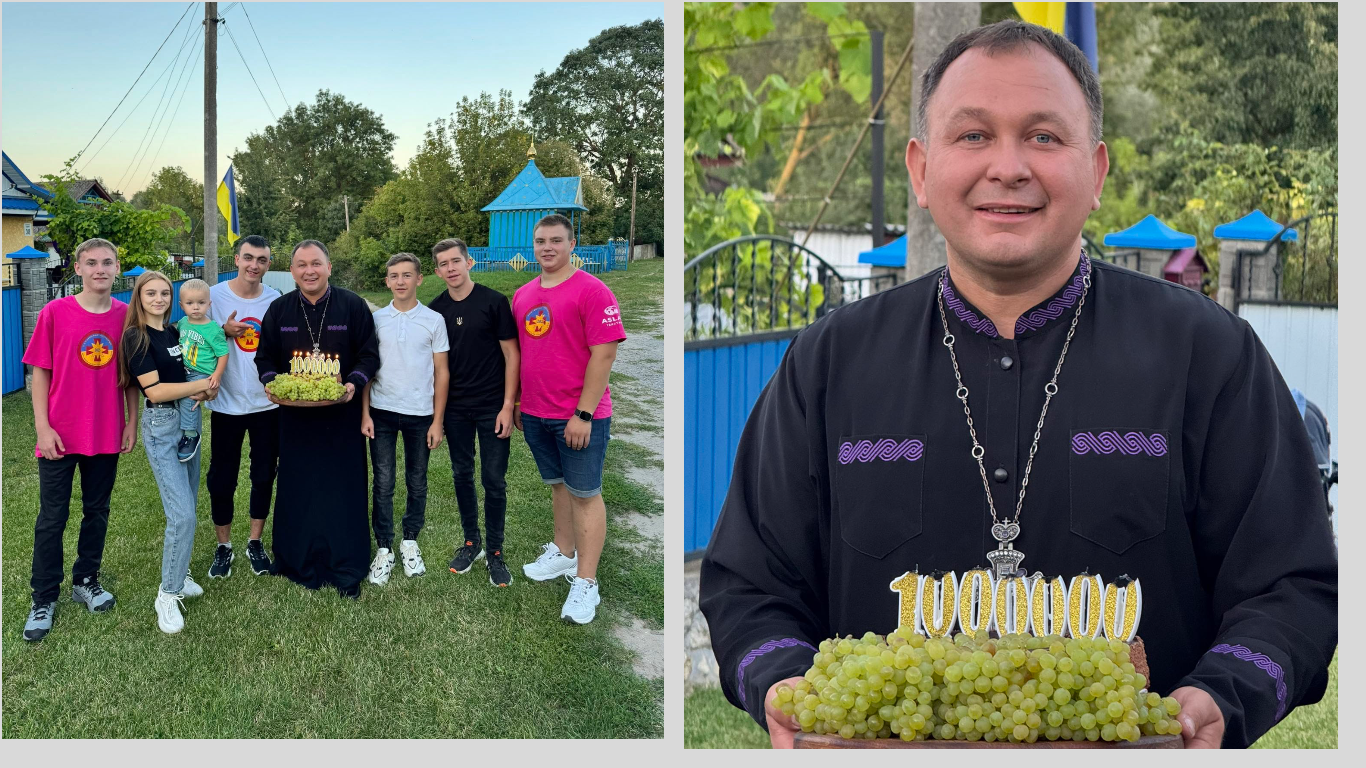
Oleksii Filiuk with a symbolic gift from his fellow villagers to celebrate reaching one million followers on Facebook
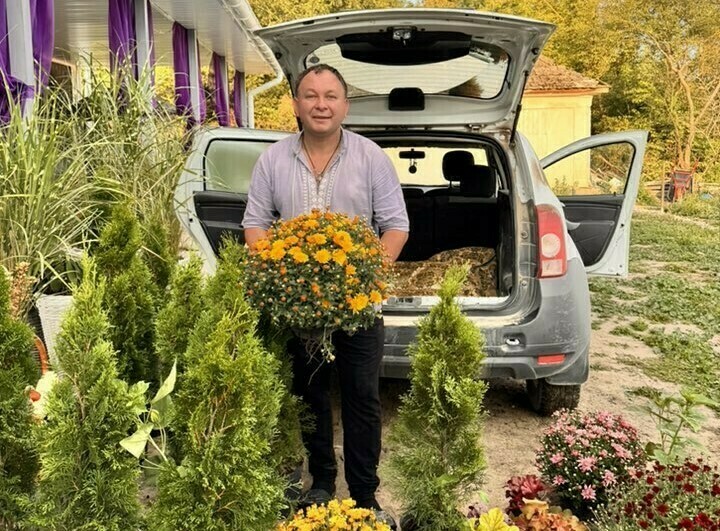
While filming an advert on Facebook
On a social laundry and Ukrainian songs
The parishes of the two churches, Bilozirka and Shushkivtsi, are small and the congregation can only just scrape together a few thousand hryvnias to pay the priest's symbolic monthly salary. After all, Father Oleksii never really relied on this money, so he has long since found work as a social manager at the local agricultural company Enselko Agro, in order to provide for himself and his sons, and ‘not look into anyone’s pocket’.
The agricultural holding understands that Father Oleksii occasionally needs to take time off work to perform his priestly duties. He therefore has irregular working hours and a flexible schedule. Nevertheless, he still has to fulfil his duties at the holding. He is responsible for various social projects in Bilozirka and Shushkivtsi, which cost the agricultural holding hundreds of thousands of hryvnias a year. These include organising village days, re-roofing the local club, installing metal-plastic windows in the post office and pharmacy, and repairing the local sewage system.
One of his recent projects is a social laundry in Shushkivtsi. Father Filiuk involved community activists from his village and the Lanivtsi City Council, which in turn attracted funding from the international humanitarian organisation Medair. As a result, a facility equipped with washing machines and shower cubicles was constructed in Bilozirka for the primary use of displaced persons.
‘The opportunity to receive grants for various good deeds is wonderful,’ says the priest. ‘By providing access to them, the decentralisation reform has significantly enriched the villages and opened up a whole new world for their inhabitants. The church is also as decentralised as possible: each parish only manages the money it collects itself. This is why I cannot ask Kyiv for funds for one project or another, as the parishes there have their own projects and expenses.’
Oleksii Filiuk is now working on creating a public space in an old, abandoned building next to a social laundry room, where people could gather to make varenyky, for example, or sing Christmas carols. The agricultural holding will provide the funds, the Lanivtsi City Council will take care of all the paperwork, and the church will revitalise the space to ensure it is not left unused. For Father Filiuk, this is not a difficult task, as he is always keen to promote the Ukrainian language and culture.
Oleksii Filiuk once organised a photo exhibition entitled ‘The History of the Village in Centuries-Old Photographs’ in one of his churches. All of the photographs in the exhibition were collected by him. He also took 18th- and 19th-century church documents, which had previously been gathering dust in his churches’ storerooms, to the regional archive. Last year, Father Oleksii published a collection of ‘365 Christian Songs for Every Day of the Year’, which sold out quickly all over the world. He often sang these songs himself, having led the vocal ensemble ‘Homin’ for over ten years. However, five years ago, he was forced to stop singing due to chronic fatigue, which had caused his voice to wheeze and become unsuitable for singing.
‘Church, music and cultural traditions play a key role in preserving Ukrainian identity,’ says the priest. ‘Where there is no Ukrainian language or Ukrainian songs, there is no Ukraine. This is particularly important for displaced people, many of whom speak Russian. They must feel in their hearts that they belong to the Ukrainian people, and then it will not be difficult for them to abandon the Russian language, even in everyday life. I tell them all openly: We don’t need the ‘Russian world’ here! If you speak Russian in Ukraine, Putin will have to come here to protect you. And that cannot be allowed to happen! The Ukrainian language should symbolise your choice of Ukraine over Russia.’
Oleksii Filiuk tries to share Ukrainian songs of a ‘patriotic and spiritual nature’ on his social media profiles such as Facebook, TikTok and Instagram at every opportunity. He does not, of course, consider Facebook or the internet in general to be ‘the spawn of evil’ or ‘a means of dumbing down humanity’.
‘It all depends on the individual,’ he believes. ‘Some people become dull-witted on the internet, while others develop thanks to it. It depends on what they do and how much time they spend there. The same applies to many things in life. Take money, for example. You may hear that money is evil. In reality, this is not the case because money itself is a neutral force that, in human hands, can kill or save lives. It all depends on who it ends up with. How can I call Facebook evil when people searching for God gather on my profile?’
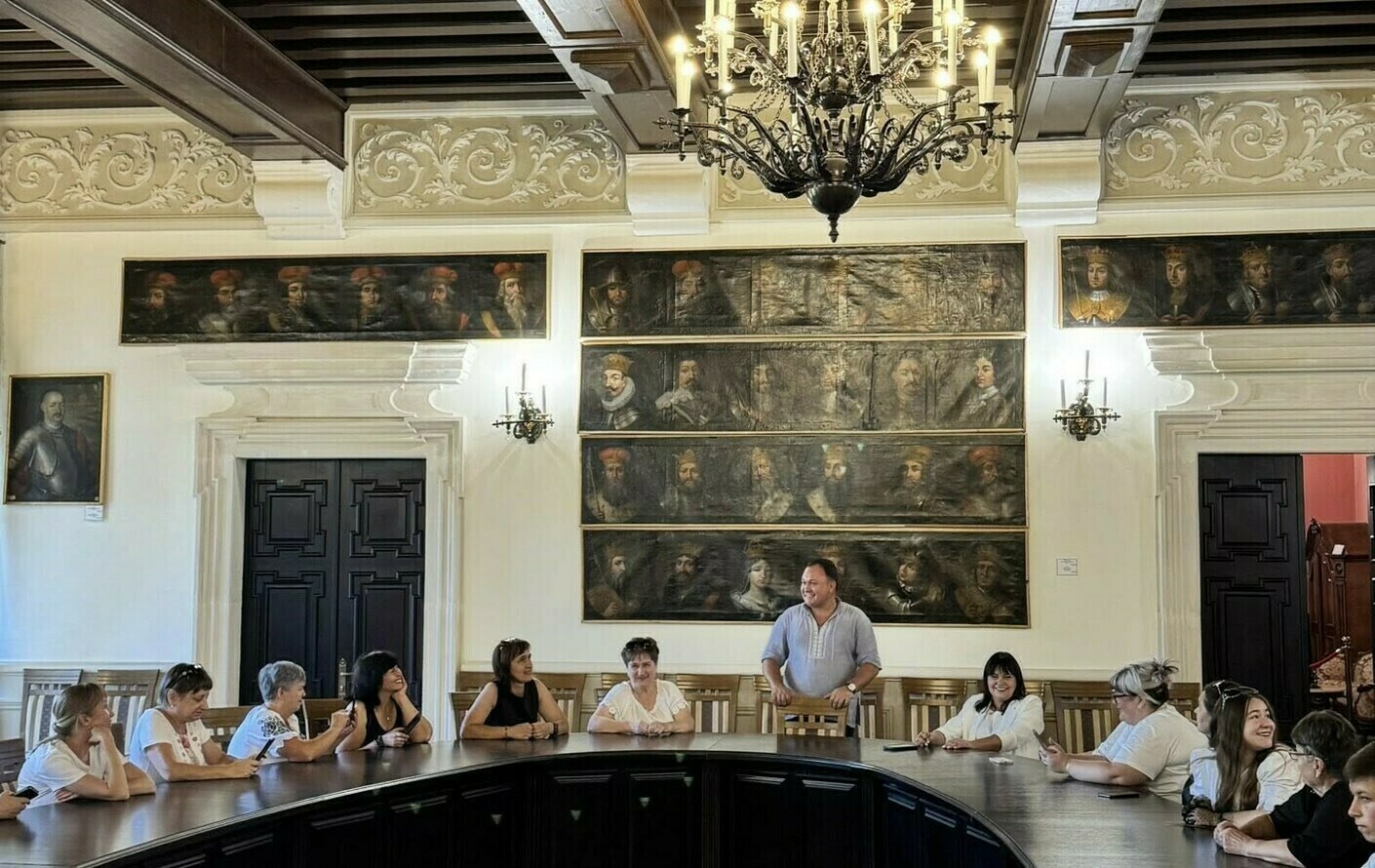
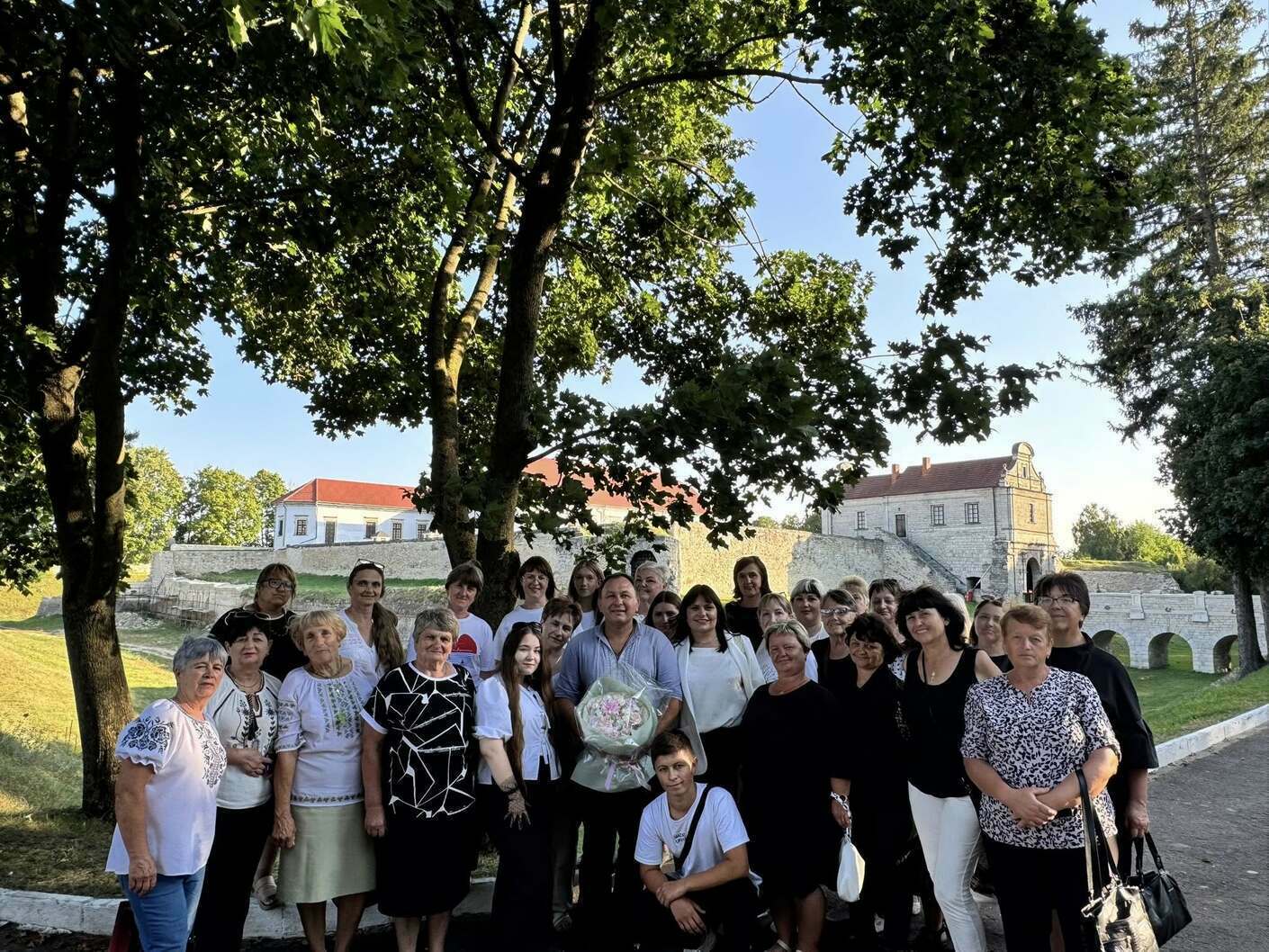
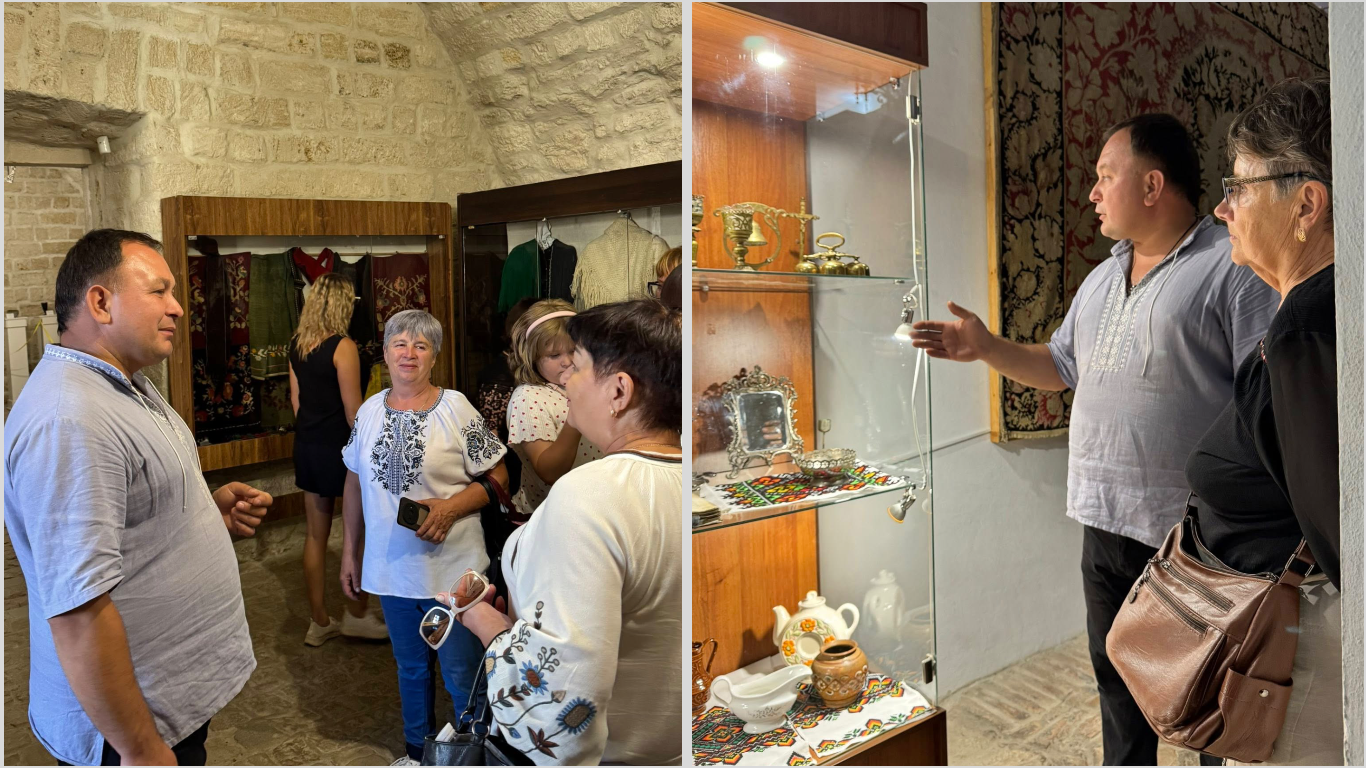
Father Oleksii Filiuk conducting a tour of Zbarazh Castle
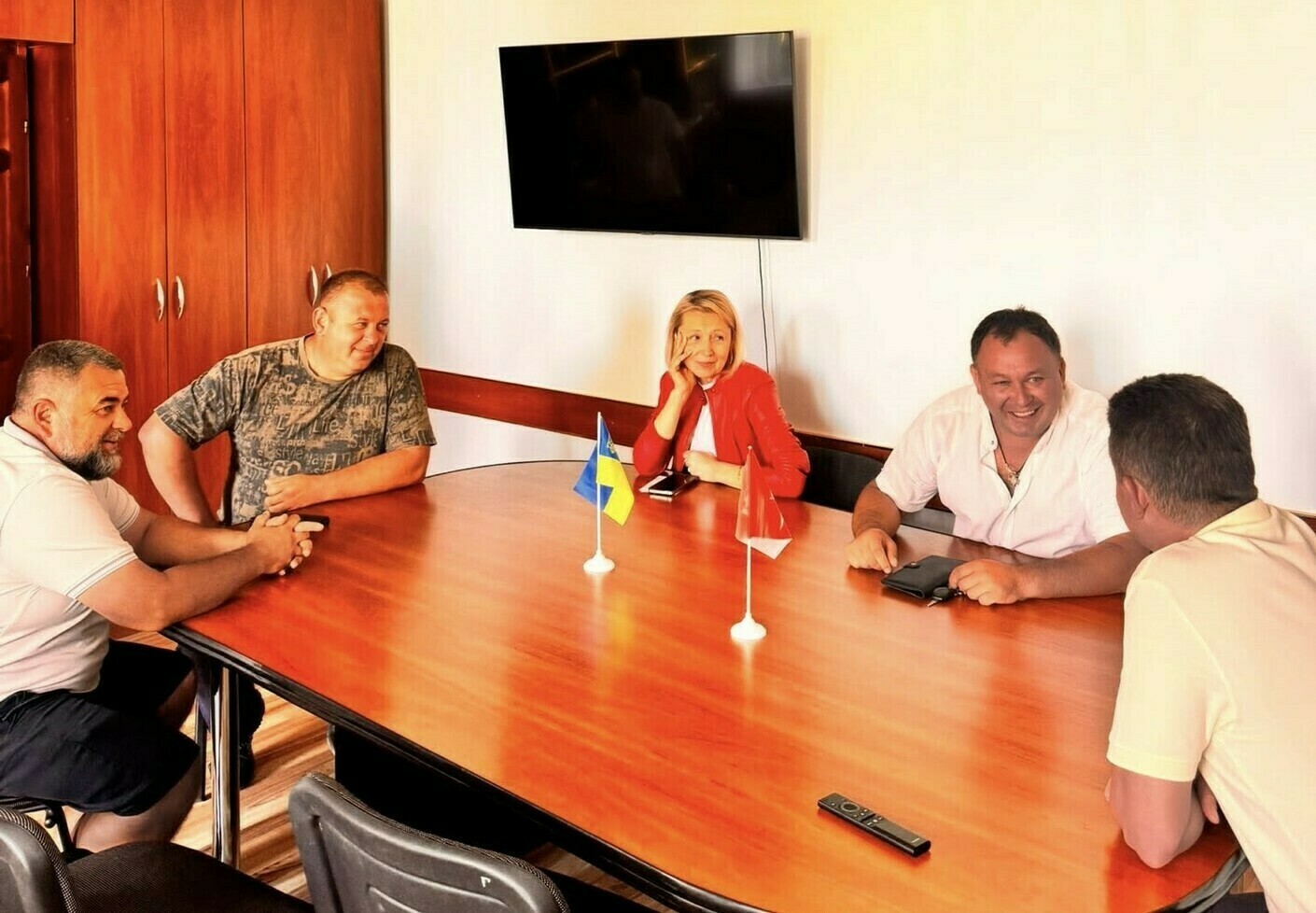
At a meeting at the Lanivtsi City Council
A typical day in the life of a priest
Every day, Father Oleksii gets up at 7 a.m., prays, and prepares food for his sons. Sometimes he posts videos on Facebook showing the delicious, nutritious meals he cooks for them. At 8 a.m., the boys have breakfast and leave for school, while Father Oleksii spends another half an hour doing household chores before leaving for work. There, he signs contracts, works with various documents, and holds meetings.
In his spare time, he volunteers as a taxi driver, taking fellow villagers to and from the hospital, driving children to school, and even taking people to Ternopil. When he has a few spare hours, he hurries to the house of his older son, Victor, who is already married, and helps with the ongoing renovations. Father Oleksii bought this house for Victor a few years ago and has almost finished renovating it. All that remains is to build a fence and complete a few other minor repairs. This help is particularly valuable to the priest because, two years ago, Victor had a son named Yulian, whom Father Oleksii adores.
As he talks about this, he sighs and glances somewhat anxiously at the shovel standing alone next to the ‘silent’ concrete mixer.
‘Sometimes I am so busy that I ask God in the morning: “Lord, preserve the lives of all the residents of my parish, because if someone dies suddenly, I won’t have time to bury them, and that would be bad”,’ says Father Oleksii. ‘The parish priest must baptise, marry and bury his parishioners himself. But sometimes I feel like I am spinning in circles. There are important projects here at the agricultural holding and it is not possible to get distracted. People send me money for advertising and ask me to promote their products on Facebook. You have to take good photographs of the products in good light. This is much harder than most people imagine. My son is also leaving to go to study, and I need to pack him some food to take with him. Then suddenly someone calls and asks me to take them to hospital. I cannot refuse because there is no one else who can take them. I am at church all day on Sundays. So there is simply no time for the funeral…’
Food is hardly an issue on days like these. Father Oleksii often only eats once a day, at around nine in the evening. At half past nine, he goes on air.
‘Some people criticise me for my unhealthy lifestyle and what they consider to be excessive media exposure. Others simply hate me out of envy,’ says Oleksii Filiuk. ‘I respond to everyone with the same thing: “Adopt at least one orphan, build them a house, give them an education, marry them off, wait for grandchildren, and then you’ll have the right to tell me how to live my life.” I say the same thing to local councillors when they engage in demagoguery at city council sessions, too. Instead of complaining, we should get to work. That is my primary piece of advice for everyone. Work is the best remedy for all ailments. To those who have accumulated a lot of wealth, I would advise visiting the cemetery more often, as it is only there that a person can truly understand that they cannot take anything with them to the afterlife. I also give the same advice to the city authorities: nurture active people because they form the backbone of the community. At the very least, they should not be hindered. If the local authorities work closely with such people, the results will be amazing!’
For the Reverend Filiuk, the greatest achievement of his life is not fame or money, but adopting four orphans. He is also proud that his friends and followers have followed his example and begun to adopt children, too.
‘My followers from Khmelnytskyi, Zaporizhzhia and Kherson adopted the children,’ says Oleksii Filiuk. ‘In total, I have been involved in eleven adoptions. These are just the ones I know about; the ones I personally advised on documents and everything else. If all Ukrainians did the same, there would be no orphanages in our country.’
Father Filiuk falls silent and looks at me expectantly. I realise that he needs to get back to work, so I ask his permission to put one last question to him.
‘On 7 September, Ukrainian Entrepreneurs’ Day, Roman Kaznovetskyi, Head of Lanivtsi City Council, presented you with a letter of appreciation in recognition of your significant personal contribution to the socio-economic development of the community. What do you think the city council valued most about your achievements as an entrepreneur?’
‘From the city council’s point of view, I think my greatest achievement was paying over UAH 100,000 in taxes to the local budget over the past three months,’ suggests Oleksii Filiuk.
Then he nods to his sons, Mykhailo and Maksym, to turn on the concrete mixer. ‘It’s half past nine – time for the daily broadcast, and there’s still so much to do!’
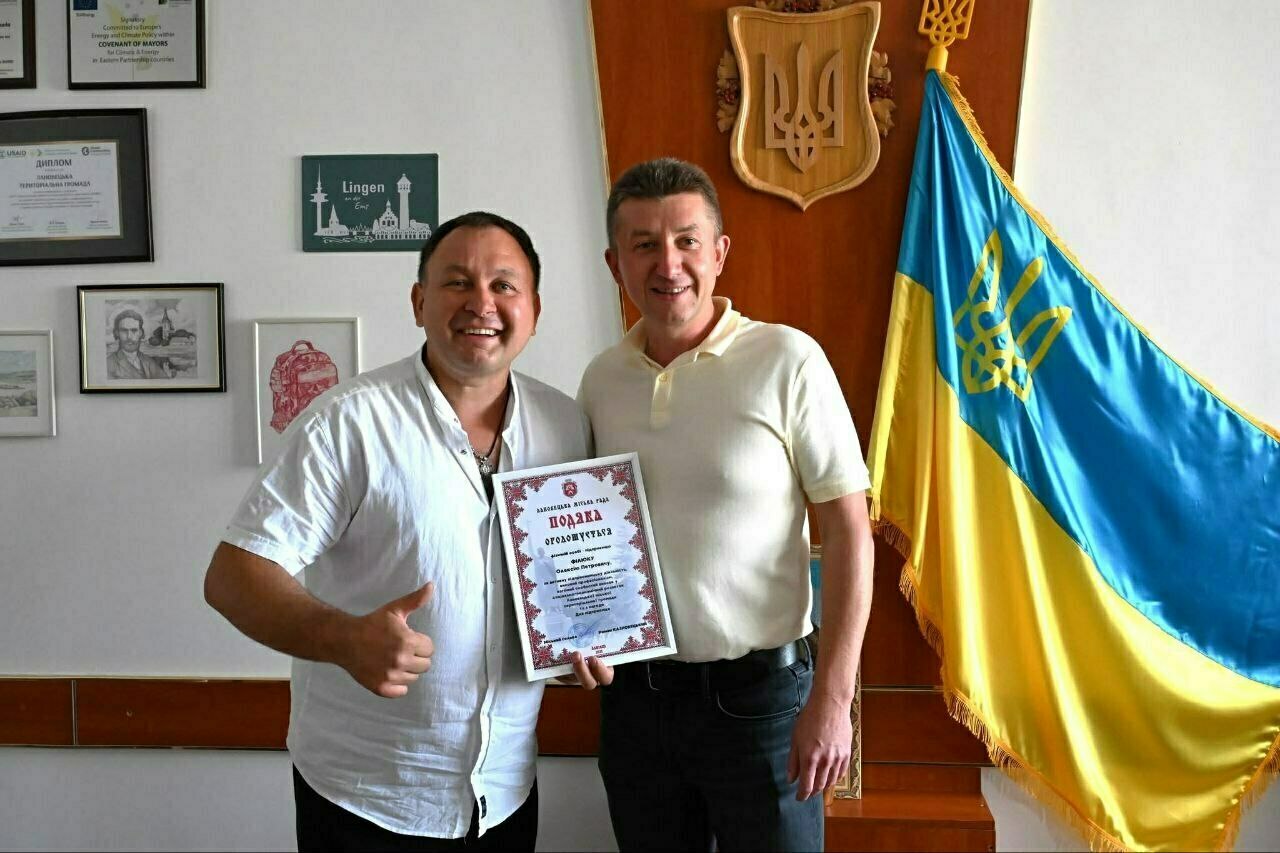
Roman Kaznovetskyi, Head of the Lanivtsi City Council, presents Father Oleksii Filiuk with a letter of appreciation in recognition of his significant personal contribution to the socio-economic development of the community
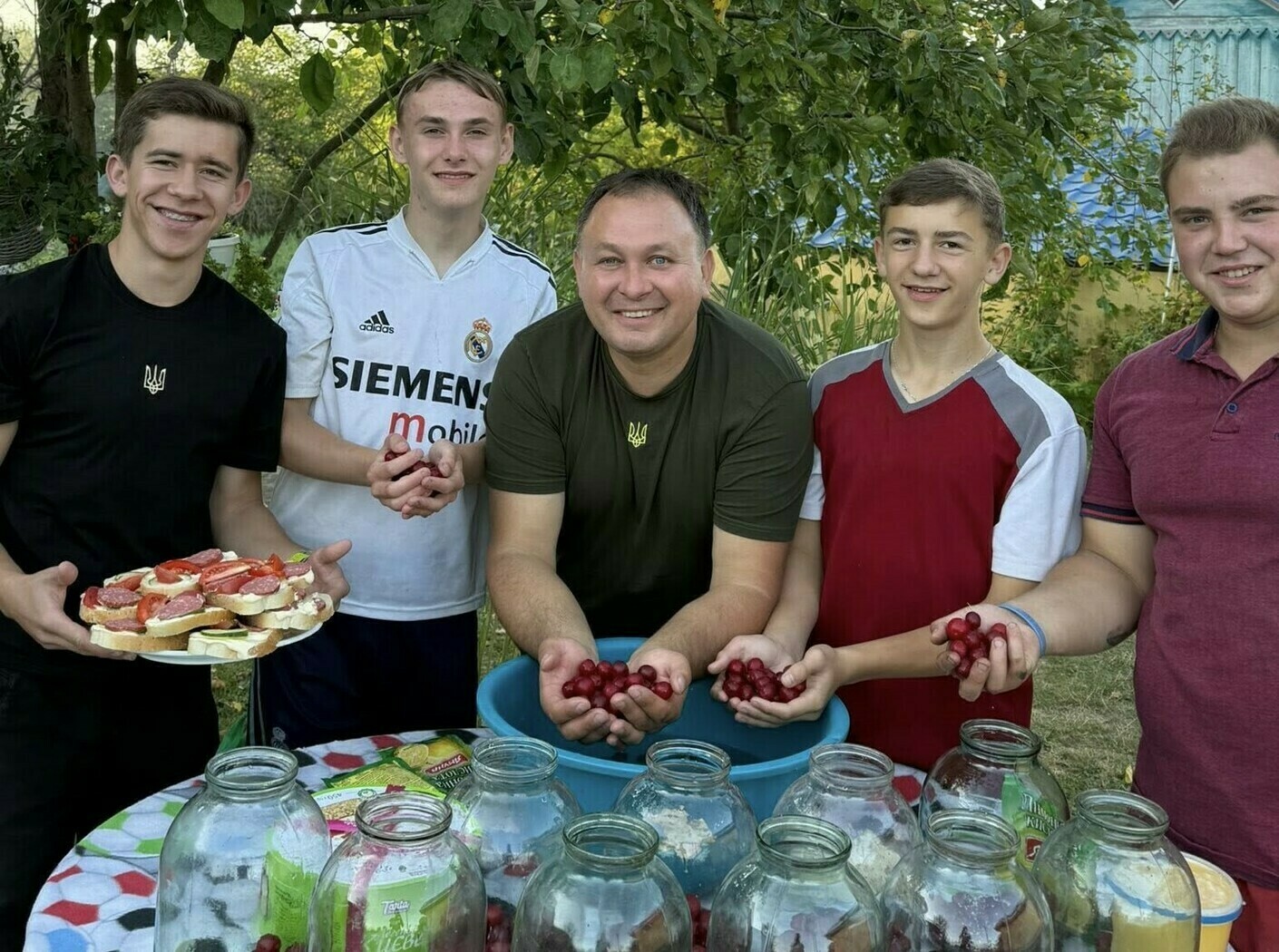
Priest and father Oleksii Filiuk and his four sons (from left to right): Viktor (22), Maksym (16), Mykhailo (15) and Serhii (18)
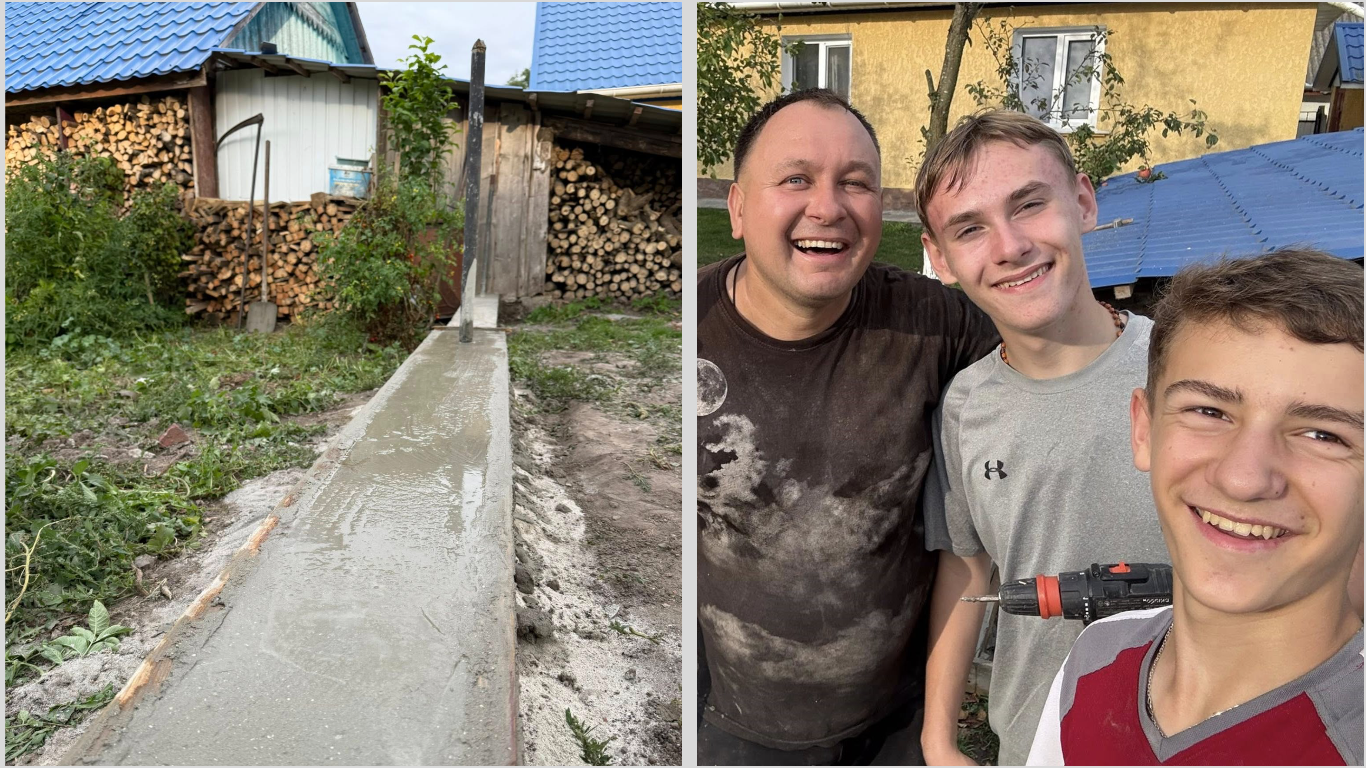
Despite the interview, the fence was finally built
Roman Kaznovetskyi, Head of the Lanivtsi City Council:
The Reverend Oleksii Filiuk provides support to the city council in several areas. Most importantly, he introduces our community to the whole world through his extremely popular Facebook account. Thanks to him, his home village of Shushkivtsi has become well known. This fame, combined with Reverend Filiuk’s active civic engagement, has attracted funding to the village. For example, thanks to his efforts, the social laundry opened in Shushkivtsi. We in the city council also realised that he would not allow this laundry to close and that these investments would not be wasted. The Reverend Oleksii’s second area of support for the Lanivtsi City Council is promoting transparent entrepreneurship. Many people here earn money in various ways, but not all of them register as individual entrepreneurs and pay taxes. He pays, and he pays a lot. The third area is the development of tourism. We have many ideas in this area, several of which were submitted by Oleksii Filiuk himself. For example, there is the Active Longevity Club in Shushkivtsi. The two churches where he serves are both included in the Lanivtsi City Council’s tourist routes... I would also like to highlight the fact that Oleksii Filiuk shares positive content on Facebook, something which is lacking nowadays. He also raises considerable funds to support our defenders. Thanks to these collections, our residents defending Ukraine from the enemy have the opportunity to obtain various necessary items. Who would buy these items if the Reverend Filiuk did not organise these collections? This is real help for the community, which greatly appreciates it.
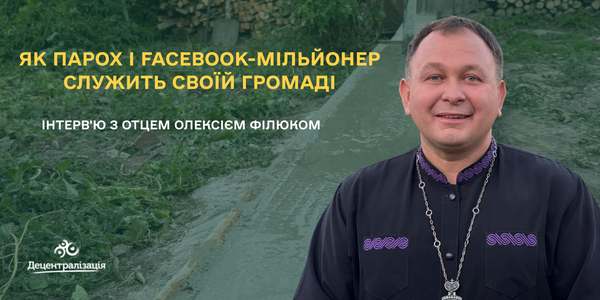
Tags:
Область:
Тернопільська областьГромади:
Лановецька територіальна громадаSource:
Портал "Децентралізація"
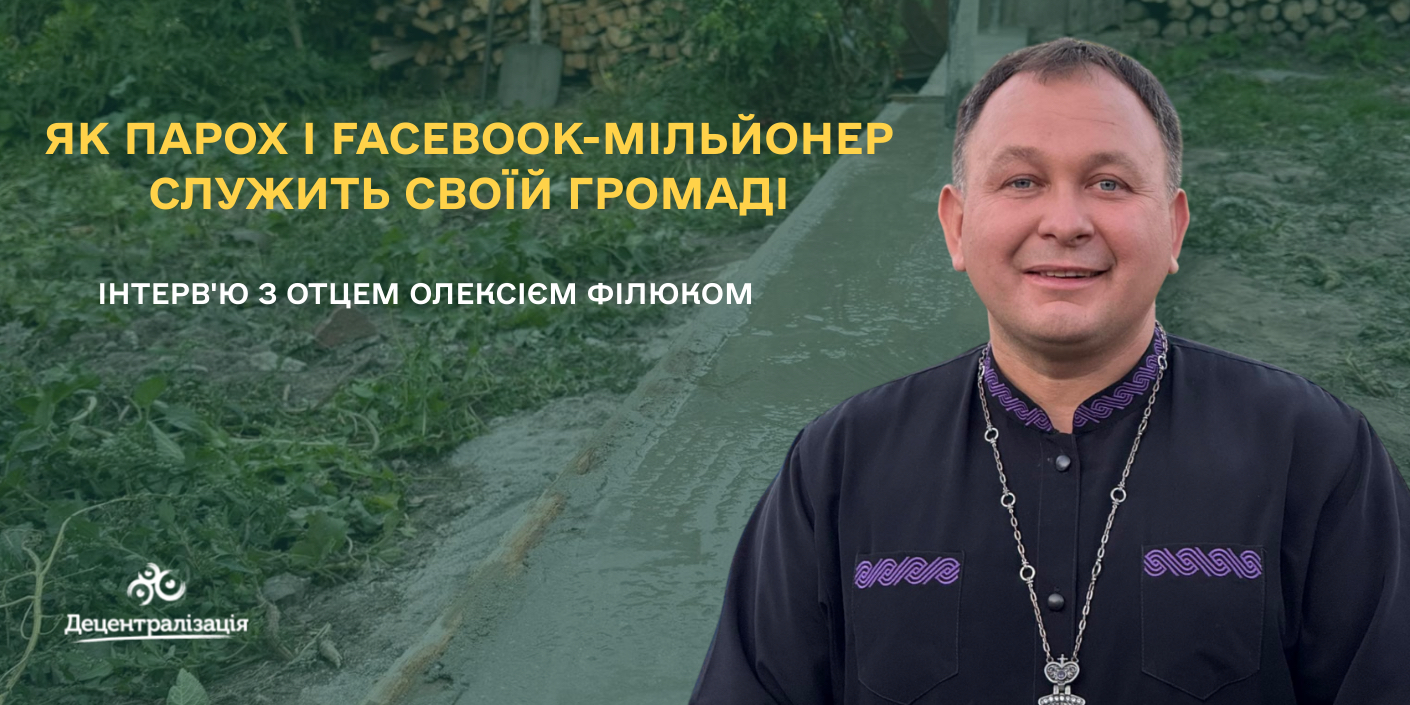
06 October 2025
Як вирішувати виклики для жінок у врядуванні: обговорювали на міжнародній конференції у Стокгольмі
Як вирішувати виклики для жінок у врядуванні:...
23-24 вересня у Стокгольмі відбулась міжнародна конференція «Переформатування влади заради рівності:...
06 October 2025
The “Decentralization” Portal is Now on LinkedIn! Join Our Professional Community
The “Decentralization” Portal is Now on...
Decentralization reform requires international dialogue and exchange of experience. To make this interaction even...
06 October 2025
План заходів з реалізації Державної стратегії...
Уряд України затвердив масштабний План заходів на 2025–2027 роки (Розпорядження КМУ від 25 вересня 2025 р. № 1047-р),...
06 October 2025
У кожному міністерстві буде заступник, відповідальний за прифронтові регіони
У кожному міністерстві буде заступник,...
Прем’єр-міністр України Юлія Свириденко наголосила, що прифронтові території є одним із ключових пріоритетів...